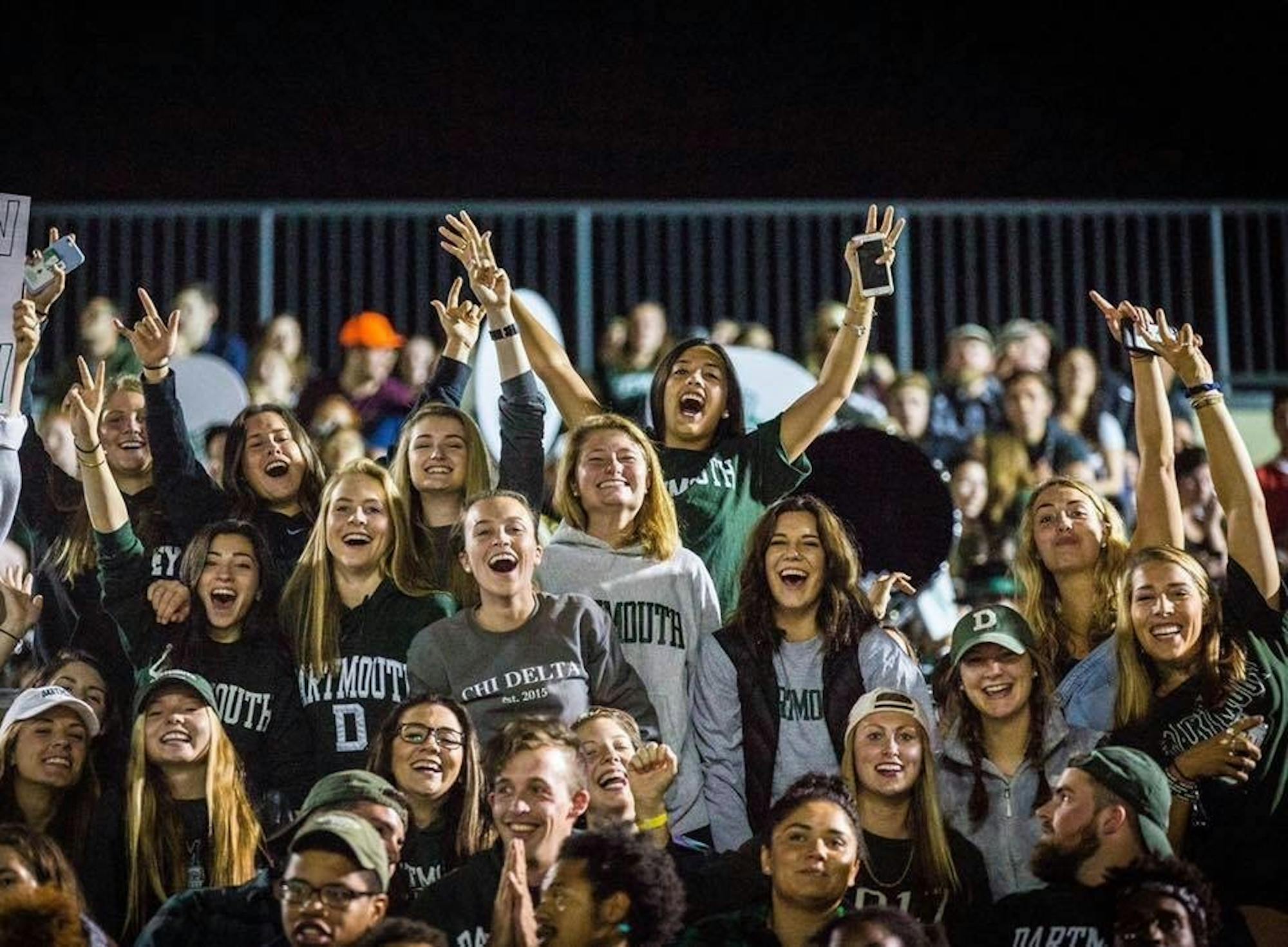In addition to traditional Homecoming activities, the College celebrated 50 years of women’s athletics since coeducation at Dartmouth with programming throughout the weekend. Events included a talk with Olympic runner and filmmaker Alexi Pappas ’12 and a dinner at the Hanover Inn for current and former female athletes, according to associate athletics director for external relations Lori McBride.
While the celebration highlighted current women’s sports, it was primarily an opportunity for alumnae to reconnect and honor decades of activism that has supported women’s sports at Dartmouth, McBride said.
“It really was the culmination of bringing together all these fabulous women across sports, which was so much fun,” McBride said. “It allowed them not only to get to know each other but also to [learn how] they supported each other back as student-athletes and then stayed friends.”
The weekend’s festivities commenced with Pappas speaking at the Black Family Visual Arts Center on Friday in an event which attracted a “lovely cross-section” of athletes, students, faculty, alumni and dedicated fans, McBride said. At the event, Pappas outlined her career as a professional long distance runner, filmmaker, author and mental health advocate.
“So much of what I learned about being a human being was done through sports, and done through sports at Dartmouth,” Pappas said in her talk, which touched on mental health, chasing dreams and relishing the present.
On Saturday, McBride said that women’s sports events — including an equestrian competition and rugby, field hockey, soccer and ice hockey games — were staggered so that alumnae could support current athletes as much as possible. McBride added that attendance was free to boost spectatorship.
On Saturday night, over 300 people attended a dinner held at the Hanover Inn Ballroom, including alumnae from all varsity and club sports, current and former women’s coaches and two current student-athlete representatives from each team. At the end of the evening, athletic director Mike Harrity announced that the jersey of basketball alumna Gail Koziara Boudreaux ’82 — whose prolific career in basketball won her the NCAA Theodore Roosevelt award and a spot on the All-American team, while her professional successes led her to her current position as CEO of Aetna healthcare — will hang in the rafters of Leede Arena. Hers will be the first jersey, male or female, to hang in the arena.
“This was just an unbelievable show of commitment and respect to the women athletes of Dartmouth,” McBride said.
While McBride said that she was proud of the progress that women’s athletics has made in recent history, she acknowledged that “a lot of advocacy has been necessary to get to where we are today.”
Chris Brownell ’87 — who was a three-sport athlete at Dartmouth, former head coach of men’s and women’s squash and is the mother of two Dartmouth women’s athletes — said she has observed four decades of this advocacy.
“I have a lot of old friends in the field, and I think our experiences at Dartmouth were much better than their experiences at other Ivy League schools,” Brownell said.
She described many of the women staff members in the athletic department as “warriors” who stood up to other staffers to secure better resources for women athletes.
“As a student myself, I felt like we got 100% of what the men got,” Brownell said. “I never, ever felt like we were second-class citizens.”
Track and cross country athlete Anya Hirschfeld ’23 added that women face different realities than men in sports, and equity alone may not be enough for female athletes to achieve their full potential. This is due in part, Hirschfeld said, to the double standards that women face in terms of appearance and demeanor and also because of gendered differences when it comes to menstrual care, nutritional needs and mental health.
Hirschfeld said that when it comes to gender-specific aid, the College still needs to hire more female coaches who may be more attentive to the needs of female athletes.
“It’s obviously uncomfortable to make broad generalizations along the gender binary,” Hirschfeld said. “But I do think that female coaches are a little bit more responsive to my physical and emotional needs than the male coaches that I’ve had in my past.”
As Dartmouth celebrates five decades of women’s sports and the activists who paved the way for the successes of current athletes, Hirschfeld said that it’s important to remember that female athletes face unique challenges in their domain — and hiring more female coaches may be the best way to attend to them.
“It’s really important that people are aware of the kind of pressures that female athletes are under,” Hirschfeld said. “I think that a really good step is just the existence of female sports teams and a very rigorous support network for them.”




